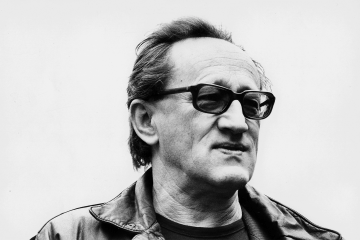Holly Case at the Poetry Foundation:
 “Unlike Lenin, Hitler came to power in a free election, which makes Auschwitz also the result of free elections.” The East German dramatist and poet Heiner Müller wrote these words in late November of 1989, on the eve of the first free elections on the territory of the German Democratic Republic (socialist East Germany) since 1932, when the Nazis came to power. Never one for feel-good moments, Müller’s thinking was deeply out of sync with the general euphoria that followed the fall of the Berlin Wall. While giving a speech on Berlin’s Alexanderplatz on November 4, 1989, he didn’t echo the sweeping optimism of the other speakers but read a statement calling for independent unions; many in the crowd booed him. In his autobiography, Müller admitted that the fall of the GDR had not been easy for him: “Suddenly there was no adversary…whoever no longer has an enemy will meet him in the mirror.”
“Unlike Lenin, Hitler came to power in a free election, which makes Auschwitz also the result of free elections.” The East German dramatist and poet Heiner Müller wrote these words in late November of 1989, on the eve of the first free elections on the territory of the German Democratic Republic (socialist East Germany) since 1932, when the Nazis came to power. Never one for feel-good moments, Müller’s thinking was deeply out of sync with the general euphoria that followed the fall of the Berlin Wall. While giving a speech on Berlin’s Alexanderplatz on November 4, 1989, he didn’t echo the sweeping optimism of the other speakers but read a statement calling for independent unions; many in the crowd booed him. In his autobiography, Müller admitted that the fall of the GDR had not been easy for him: “Suddenly there was no adversary…whoever no longer has an enemy will meet him in the mirror.”
That line proved prophetic. As he was dying of throat cancer in 1995, just a few years after assuming the directorship of Bertolt Brecht’s famous Berliner Ensemble theater, he expressed admiration for his fatal tumor.
More here.
